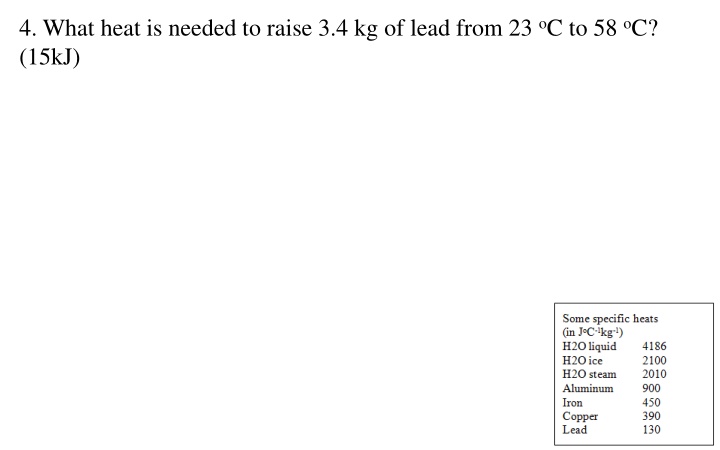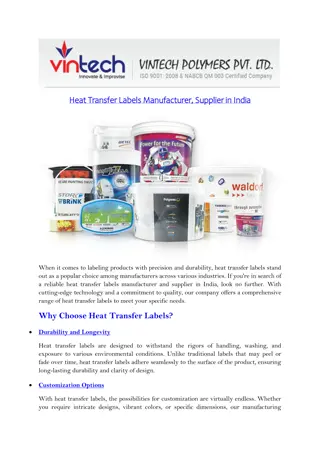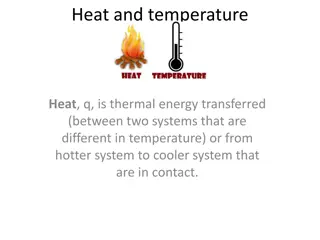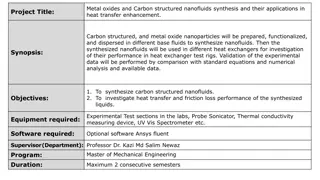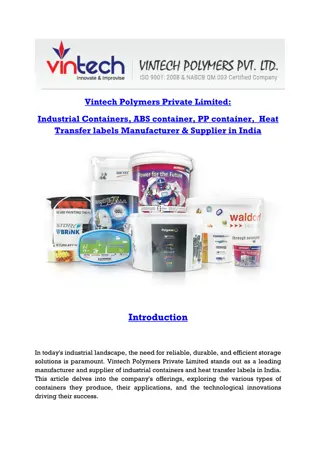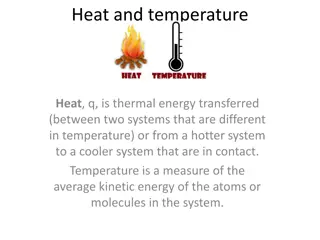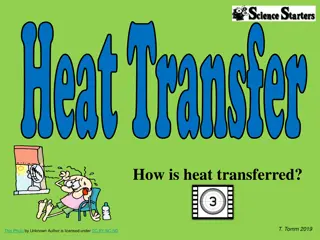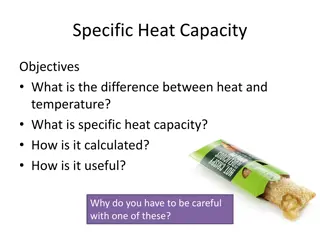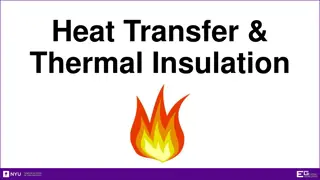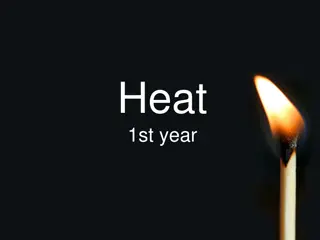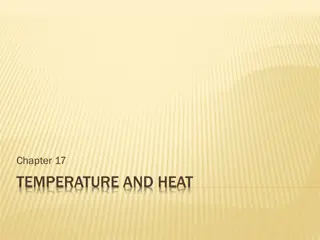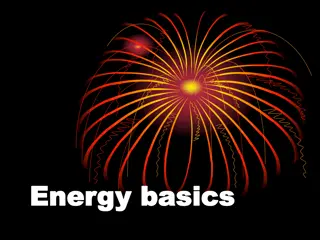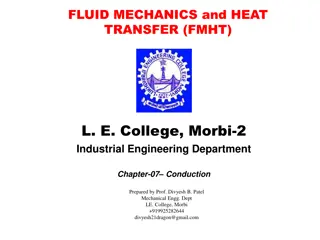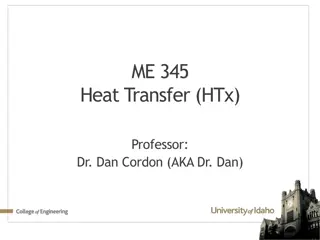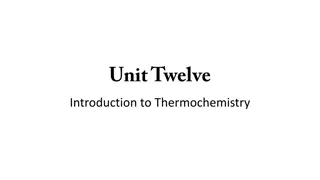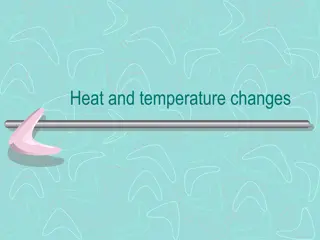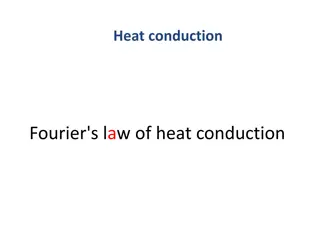Energy and Heat Transfer Problems Explained
Solve various physics problems related to heat transfer, specific heat, latent heat, and efficiency in heating devices. Calculate the amount of heat needed to raise the temperature of different substances, melt solids, and evaporate water. Explore concepts like specific heat, latent heat of fusion, and energy dissipation in different scenarios.
Download Presentation

Please find below an Image/Link to download the presentation.
The content on the website is provided AS IS for your information and personal use only. It may not be sold, licensed, or shared on other websites without obtaining consent from the author.If you encounter any issues during the download, it is possible that the publisher has removed the file from their server.
You are allowed to download the files provided on this website for personal or commercial use, subject to the condition that they are used lawfully. All files are the property of their respective owners.
The content on the website is provided AS IS for your information and personal use only. It may not be sold, licensed, or shared on other websites without obtaining consent from the author.
E N D
Presentation Transcript
4. What heat is needed to raise 3.4 kg of lead from 23 oC to 58 oC? (15kJ)
5. If 23.0 kg of copper at 21.0 oC absorbs 45.6 kJ of heat, what will be its final temperature? (26.1 oC)
6. If some aluminum at 57.0 oC, cools to 24.1 oC, and gives off 13.4 kJ of heat, what is its mass? (453 g)
7. 35.0 g of a mystery substance absorbs 314 J of heat and raises its temperature by 2.14 oC. What is its specific heat? (4190 JoC-1kg-1)
8. A 125 Watt 100% efficient heater is immersed in a 503 ml container full of water. In what time will the heater heat the water from 21.0 oC to boiling? (1330 s)
9. Another 1250 Watt heater can raise 2.35 liters of water from 14.5 oC to 36.6 oC in three and a half minutes. What is its efficiency? (.828 or 82.8%)
12. What heat does it take to melt 25 kg of solid iron already at the melting point? (7.2E6 J)
14. If it takes 45,120 J of heat to melt 172 g of a mystery substance, what is its latent heat of fusion? (2.62E5 J/kg)
15. A runner sweats away 3.5 kg of water through evaporation. What heat did they dissipate? (7.9E6 J)
17. What heat do you need to heat 23.5 Kg of ice at -167.0 oC to water at 92.0 oC? (2.51x107 J)
18. What heat do you need to heat 3.61 Kg of water at 76.0 oC to steam at 142 oC? (8.83x106 J)
19. 112. grams of a mystery liquid at 83.0 oC is mixed with 564 grams of water initially at 22.0 oC. The final temperature of the mixture is 33.0 oC. What is the specific heat of the mystery liquid? (Assuming no heat was lost to the surroundings) (4640 J kg-1 oC-1)
20. A piece of lead (c = 130 J/kg/oC) at 82.0 oC is mixed with 112 grams of water and an 87.5 g aluminum (c = 900. J/kg/oC) calorimeter cup initially at 25.0 oC. The final temperature of the system is 56.0 oC. What is the mass of the piece of lead? (Assuming no heat was lost to the surroundings) (5.02 kg)
21. 89.2 g of a mystery substance is at 99.20 oC, and it is placed in a 95.0 g iron container holding 216 ml of water both at 21.01 oC. The final temperature is 23.38 oC. What is the specific heat of the substance? (332 J/kg/oC)
22. A 347 g piece of copper at 98.0 oC is placed in a Styrofoam cup containing 259 ml of water at 18.0 oC. What will be the final temperature of equilibrium? (Ignore the Styrofoam) (26.9 oC)
23. A 13.5 g piece of aluminum at 93.9 oC is placed in an 82.0 g iron calorimeter containing 203 g of water both at 23.0 oC. What will be the final temperature? (24.0 oC)
26. Label the graph where the KE is increasing, and where the PE is increasing. Temperature vs Heat added for .0160 kg 140 120 Temperature in Celsius 100 80 60 40 20 0 0 100 200 300 400 500 600 700 800 Heat added in joules
27. What is the melting point? What is the boiling point? (30. oC, 80. oC) Temperature vs Heat added for .0160 kg 140 120 Temperature in Celsius 100 80 60 40 20 0 0 100 200 300 400 500 600 700 800 Heat added in joules
28. What is the specific heat of the solid, liquid and gas phase? (104 J/kg/oC, 188 J/kg/oC, 156 J/kg/oC) Temperature vs Heat added for .0160 kg 140 120 Temperature in Celsius 100 80 60 40 20 0 0 100 200 300 400 500 600 700 800 Heat added in joules
29. What is the latent heat of fusion and vaporisation? (9380 J/kg, 15,600 J/kg) Temperature vs Heat added for .0160 kg 140 120 Temperature in Celsius 100 80 60 40 20 0 0 100 200 300 400 500 600 700 800 Heat added in joules
30. Label the graph where the KE is increasing, and where the PE is increasing. Temperature vs Heat added for .026 kg 140 120 Temperature in Celsius 100 80 60 40 20 0 0 100 200 300 400 500 600 700 800 900 1000 Heat added in joules
31. What is the melting point? What is the boiling point? (40. oC, 80. oC) Temperature vs Heat added for .026 kg 140 120 Temperature in Celsius 100 80 60 40 20 0 0 100 200 300 400 500 600 700 800 900 1000 Heat added in joules
32. What is the specific heat of the solid, liquid and gas phase? (48.1 J/kg/oC, 240. J/kg/oC, 76.9 J/kg/oC) Temperature vs Heat added for .026 kg 140 120 Temperature in Celsius 100 80 60 40 20 0 0 100 200 300 400 500 600 700 800 900 1000 Heat added in joules
33. What is the latent heat of fusion and vaporisation? (7,690 J/kg, 11,500 J/kg) Temperature vs Heat added for .026 kg 140 120 Temperature in Celsius 100 80 60 40 20 0 0 100 200 300 400 500 600 700 800 900 1000 Heat added in joules
